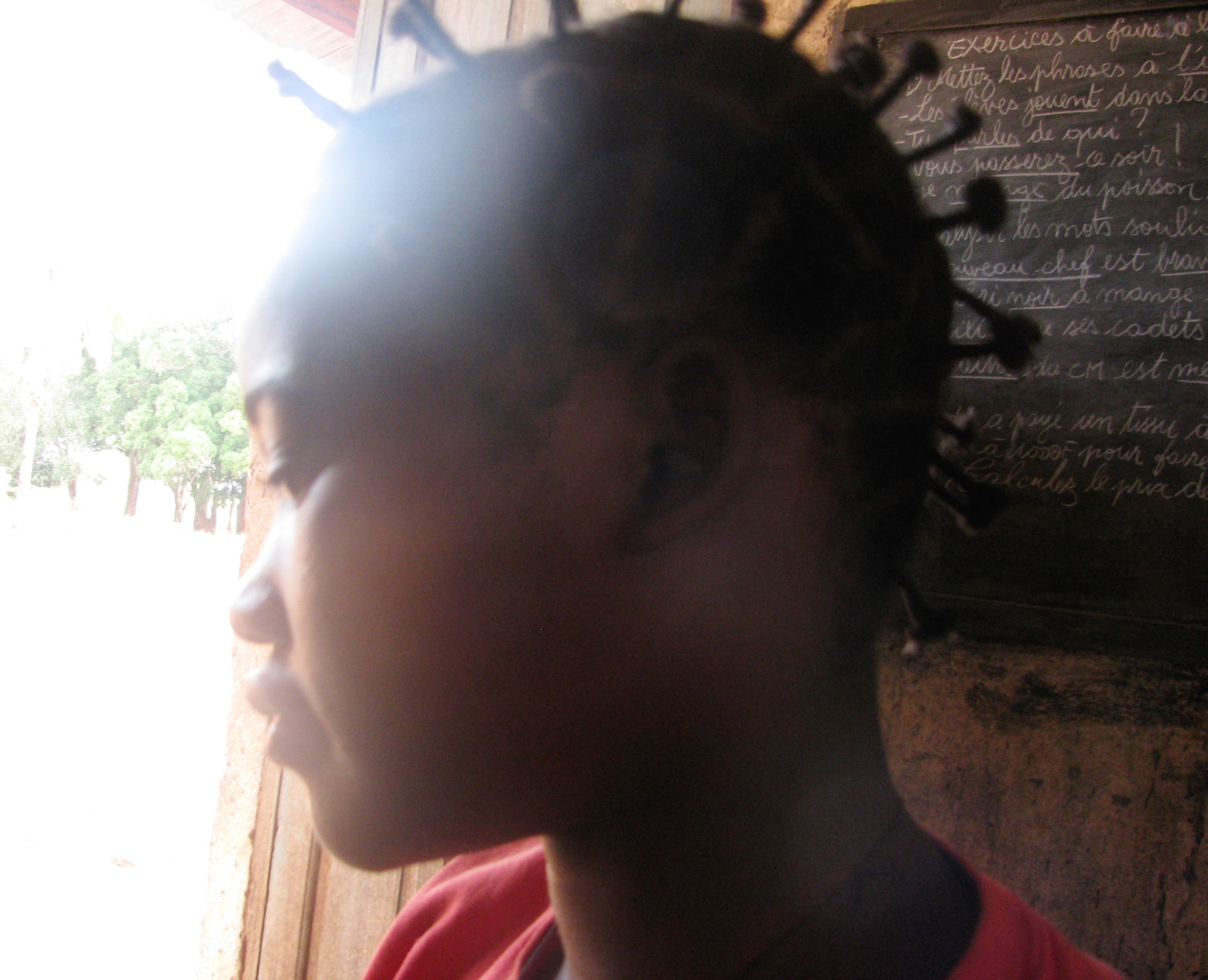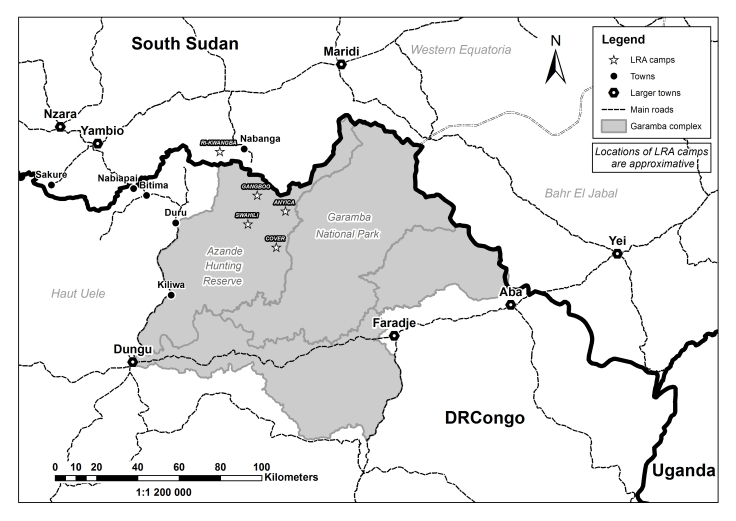From time to time, we come across a story that reminds us of the complicated lives of those held captive by Joseph Kony’s Lord’s Resistance Army (LRA). Aimee’s is one of those stories.
We learned the details of Aimee’s life in the LRA through our good friend and researcher Ledio Cakaj. Ledio has spent nearly a decade researching and writing about the LRA — traveling throughout Uganda, South Sudan, and the Democratic Republic of Congo (DRC), interviewing scores of former LRA child soldiers and captives. Late last year, Ledio released When the Walking Defeats You: One Man’s Journey as Joseph Kony’s Bodyguard. It’s an insider’s account of life in the LRA, based on hours of interviews with George Omona, a former LRA fighter. (If you haven’t already, we definitely recommend giving it a read. You can buy the book here.)

It was in those interviews with George that Ledio learned much of what is known of who Aimee was and the life she lived in the LRA. Like hundreds of other young girls and boys, Aimee was forcibly taken from her home in DRC by a group of LRA fighters and became part of a life and a conflict that she didn’t choose and didn’t want.
Aimee’s story is striking, but it’s not the only one like it. While it doesn’t end with her own homecoming, her strength and determination inspires us to continue our work to bring every captive held by the LRA home to their families and to the lives they deserve. That’s why we continue to partner with central African communities and local FM radio stations to broadcast ‘Come Home’ radio messages that encourage captive like George and Aimee to escape by letting them know that their families and communities are waiting for them with open arms.
Read Ledio’s telling of Aimee’s story below, and consider giving to support programs like our ‘Come Home’ radio messages and other innovative programs that are helping to dismantle the LRA from within and protect central African communities so that children like Aimee and their families have the safety they need and deserve.
MAKE A DONATION IN HONOR OF AIMEE TODAY

She was “the most beautiful girl in the world,” “shy and smiley,” and “a fierce commander,” according to various accounts. It feels difficult reconciling these statements with all other descriptions of ‘Aimee, the Congolese,’ the small-bodied young girl with a radiant smile and a sense of humor incongruous with the harsh environment she was forced to inhabit. Her story is one of defiance and struggle to survive the world’s most brutal armed group, the Lord’s Resistance Army.
Over the last decade of research on the LRA, a rebel outfit that has terrorized civilians in central Africa for 30 years, Aimee’s name came up frequently. Former LRA members mentioned her in passing but the best source of information was a young Ugandan named ‘George,’ one of the main characters in my book, “When the Walking Defeats You; A Man’s Journey as Joseph Kony’s Bodyguard (Zed Book 2016). Aimee was, for a brief but intense moment, a bright light in George’s three dark years with the LRA.
Aimee, meaning ‘loved’ in French (as Aimée), was born in the mid 1990s in a small village near Garamba National Park in northeastern Democratic Republic of Congo (DRC). Conflict in neighboring Sudan brought starving, armed southern Sudanese rebels to the park as a hideout, often attacking the villagers who lived nearby. Congolese bandits and predatory national army soldiers added to the hardships her community endured. Aimee and her family eventually took refuge in southern Sudan where she learned English, only returning to Congo in the early 2000s, hoping their home area was finally safe.
In October 2005, a small group of mostly Ugandan rebels arrived in the Azande Hunting Reserve, Garamba Park’s western bloc. About 80-armed men, wearing their hair ‘rasta’ style, comprised the advance party of the LRA of Joseph Kony. At the time, the LRA numbered over 1000 people, including women and children, arriving in Garamba in waves throughout 2006. They came to Congo to negotiate a peace agreement with the Ugandan government but fighters, on Kony’s orders, resorted to abducting children from the surrounding communities: young boys to train as soldiers to boost Kony’s army, and the girls were to ‘wed’ Kony and his commanders. It was a strategy Kony had practiced for twenty years resulting in nearly 100,000 cases of abductions from Uganda and eventually Suouth Sudan and Congo.

LRA camps in Garamba National Park, DRC, in early 2008
Aimee was 12 or 13 years old when Kony’s men kidnapped her in late 2006 or early 2007. Kony chose her as a ting ting, the LRA term for young girls who cleaned and took care of commanders’ children. George, an 18-year-old high school dropout from Northern Uganda, arrived in the LRA camps in April 2007 and immediately took a liking to Aimee. She spoke English and was happy to talk to George, who was going through a hard time adjusting to the harsh reality of rebel life. A tentative friendship, possibly even more George wished, blossomed under the cover of war.
Despite the traumatic events they witnessed, both George and Aimee managed to survive their first year in the LRA relatively unscathed. In October 2007, Kony ordered the killings of his top deputy, Vincent Otti, and his loyalists, accusing them of betrayal and having them executed by firing squad. And in early 2008, Kony claimed that one of his ‘wives’ had had intercourse with one of his bodyguards. Kony had them both strangled and shot, their bodies left to rot in the open as warnings to others. He then ordered the beatings of his other 12 ‘wives’ and over 70 bodyguards, including George. Kony threatened all his men with death were they to be alone with, or even touch, his ‘wives.’
By the end of 2008 the peace talks between the LRA and the Ugandan government had stalled for good and the Ugandan army attacked LRA bases in Garamba prompting the rebels and their families to scatter throughout northeastern Congo. George said he happy to have survived the aerial bombardments and happier still that Aimee had too. George thought Aimee had grown into one of the most beautiful women he had ever seen, often gushing to me about her dark brown skin and her big and beautiful eyes, and her thick curly her hair pulled into numerous small bunches on her head in the Congolese fashion that George thought suited her well.
Aimee quickly became a welcomed distraction from George’s otherwise dreary experience. He was happy to see her every day and tried to talk to her once a day. He wasn’t alone. Everyone who saw Aimee seemed to admire her looks and wisdom, and George was thrilled that she always talked to him whenever he approached her. Kony routinely rewarded his loyal soldiers with ‘wives’ and George hoped that if he performed well, obeyed orders and fought hard, he could earn a promotion and maybe Aimee as a bride. He tried to ignore what he knew well; that the quest to survive was the only certainty in the LRA. Love was an unaffordable luxury.

A teenager from CAR was briefly abducted by the LRA in mid 2009. Djemah, CAR, March 2010.
In the first two months of 2009 Kony forced his group of 200 people to walk between the borders of Sudan and the Central African Republic (CAR) to escape pursuing Ugandan soldiers. Food and water were scarce, and many perished from hunger and extreme fatigue. By the end of March, Kony had resolved to walk to CAR, promising his exhausted followers that there they would be left alone. So began a soul-crushing three hundred mile march through dense vegetation George and others had to cut through using machetes and bayonets. Aimee was, George told me, his only joy.
The march to CAR would break George’s heart and his body: Kony decided that he wanted Aimee as yet another wife. Aimee must have heard the news as she seemed distracted and was unusually silent. She told George that she did not want to be Kony’s wife. “He has so many wives already, why take another one?” Aimee suggested she might reconsider if Kony was willing to leave all his other wives and only marry her. “One man and one woman, just like the pastor in my church said was proper in God’s eyes.” George said nothing, knowing all hope was lost.
Kony learned about Aimee’s refusal and decided to visibly and painfully punish her. He ordered his bodyguards to load her with heavy luggage and make her carry his three-year-old daughter, Lakot. George recalled how Aimee struggled to walk, falling often to the ground and barely making it to the rest stops. She was obviously exhausted and had no time to sleep or wash herself as the guards tormented her by sending her to fetch water early in the morning and collect firewood and clean late into the night. Her clothing tore, and she stumbled about the forest exposing her frail, unclean body.
George would not laugh when other bodyguards made jokes about how flies rumbled around her because of her stench. He almost started a fight when they called her a moving latrine. But most of all he was angry with himself for not being able to rescue her. Aimee had become emaciated, almost skeletal. George fretted at nights that she would be dead by morning and yet he was amazed to see her every morning, resolved to quietly carry on.
A week later, Aimee was told to only carry little Lakot. Kony had come to her rescue, ordering his guards to leave her alone. He sent her two new dresses and ordered his other ‘wives’ to bring her food. Soon, she began to look better, even smiling once in a while, but George feared Kony had broken her.
One evening soon after George was on guard duty in Kony’s yard. Alongside other bodyguards George set about preparing Kony’s place of rest for the night. They warmed water over an open fire and filled an aluminum bathtub that abductees carried during the day, and dug a pit latrine – a hole in the dirt surrounded by a few tree branches – near Kony’s tent. George waited for orders from Kony’s ADC (aide de camp) to bring a wife to spend the night with the boss, as was custom.
George remembers clenching his fists when the ADC asked him to fetch Aimee. Like all his other ‘wives,’ Aimee was to go to Kony’s tent, prepare his bed and wait for him to finish his bath. The two would be served dinner and left alone for the night. George went to Aimee and asked her in a somber tone to follow. She understood and took a few minutes to wash. She paid no attention to George as she washed, unconcerned with exposing her body. He tried to avoid staring at her, sensing keenly that to him she was now lost forever.
Early the following morning, when George started to pack the tent and Kony’s possessions before the day’s march, he saw Aimee who seemed well rested. It was no wonder since she had slept on a mattress that night, not on the cold, hard dirt. She looked different, “shy but smiling,” George would tell me. The other bodyguards also noticed. “Ladit (Sir) made her happy,” they joked. The team packed Kony’s tent and started the day’s journey. George tried his best to avoid staring at her throughout the day.
Later that evening George set up Kony’s compound for the night. After orders were given to bring a wife to the tent, two guards found that Aimee had already entered the tent to prepare Kony’s bed. According to LRA rules it was a grave security breach for anyone to enter Kony’s tent without permission and the guards immediately grabbed her. They were about to bring her in front of Agweng when Kony came out of his bath and asked what was happening. When the guards told him, Kony laughed and ordered her release.
So it was that without permission, Aimee spent a second consecutive night with the Big Teacher. It was rare for any woman to spend two consecutive nights with Kony – throughout his time in the LRA, George had never witnessed such an event. Most wives who spent a first night in Kony’s tent were asked to join him again only after weeks or even months passed. Some wives only spent one night with him, never coming back to his tent again. But Aimee was different, unconcerned with rules, and ‘really stubborn,’ according to George. She quickly became Kony’s favorite wife, his ‘Queen,’ as he started to refer to her.
George managed to escape and returned to Uganda in 2010. He never saw Aimee again. Kony and his group were pursued by Ugandan soldiers in CAR, and walked hundreds more miles to Sudan’s Southern Darfur region. In a 2011 raid, on one of the LRA camps there, Ugandan commandoes recovered papers left behind by Kony and his men who had vacated the camp just hours prior. Next to scores of card games Kony and others had played, were the names of people tasked with exchanging goods for food in the local market, a crucial assignment. Aimee’s name was at the top of the list.
Since her ‘marriage’ to Kony in 2009 Aimee had become one of his most trusted people. Recent defectors have said she was armed –unusual in the LRA for the last 15 years as Kony expressly forbid women from carrying weapons – a clear indication of her status. From 2014 some defectors referred to Aimee as Deputy Director of Intelligence. To my knowledge no other woman has ever held such a significant position in the organization.
Earlier this year, a young defector, who had been part of Kony’s group, claimed that Aimee was killed on Kony’s orders. It is unclear how or why she died. Kony has a history of killing people close to him who might have seen him for what he truly is – a paranoid, predatory and insecure man. He has killed two previous deputies and a number of top commanders, many of whom grew up under his ‘roof.’ Perhaps this is why he has to surround himself with children, because adults who get close to him quickly see through his charade and insecurities.
International Criminal Court Chief prosecutor Fatou Bensouda, referred recently to women in the LRA as “spoils of war, awarded as prizes, without any more say in the matter than if they had been inanimate objects.” Aimee might have disagreed. She might have said what George told me was one of her favorite sayings, “There is no justice in the world, only the fight to stay alive.”
While Aimee was never able escape captivity, our hope is that others like her will have their own chance at freedom. Every day our ‘Come Home’ radio messages are helping to break down the barriers of fear and encouraging those still held captive by the LRA to escape and return to their families. We won’t stop until every last LRA man, woman, and child held in captivity is free and has the safety they need and deserve.
HELP US BRING LRA CHILD SOLDIERS HOME AND END VIOLENT CONFLICT IN CENTRAL AFRICA. GIVE TO SUPPORT OUR PROGRAMS TODAY.
Think people should hear about this?